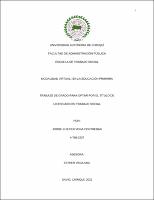Modalidad virtual en la educación primaria.
Resumen
This research aims to analyze the challenges faced by parents in the virtual modality in
primary education; since they become real and arise once the pandemic situation in the country
is declared.
This study is developed according to the structure formulated, for it, in three chapters; It
begins with the statement of the problem, then the methodological framework described through
the qualitative approach; Given the importance of knowing the perspective that the actors have
on the problem and an exploratory-descriptive scope is used, because there are no previous
studies that allow us to know about the issue in the approach.
Due to its characteristics, the design used is phenomenological and its purpose is to
explore, describe and understand the experiences of social actors; In relation to the type of
sample, it is diverse or of maximum variation and includes five parents with children enrolled at
the primary level, who to play the role of guardian are responsible tutors to guide their children
in the teaching-learning process.
Regarding the techniques applied for the collection of information, we consider:
participant observation and semi-structured interview since, within its objectives, it allows the
researcher to delve into the subject, knowing about ideas, opinions, behavior, habits, feelings
and the family dynamics in the face of the problem raised.
The third and last chapter is dedicated to the interpretation and analysis of the
information collected, through the categories and subcategories formulated in this study,
identifying and achieving knowledge, skills and participating family members; as well as
situations and events experienced by parents, when faced with the use of technology; as a
primary tool for their children's learning.

